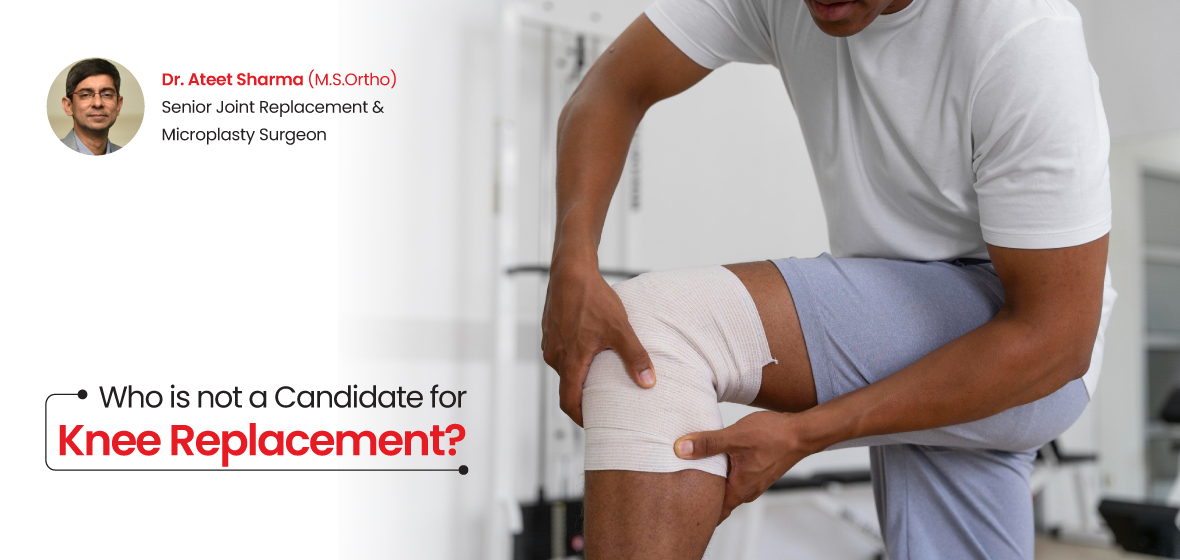
For many people, knee ache becomes a constant companion, one which dictates their workouts and limits their daily routine. Knee replacement surgery can be a hope for them, a way to regain flexibility and live without aches. But what if you come to know that this solution won't be the proper one for you?
It is a harsh realization, specifically when you have been keeping onto the desire that surgical operation can be your solution to get back your comfort. But knowing why knee replacement is not a good choice for you is as crucial as knowing while it is. Knowing whether you're a candidate is not just about your knees, normal fitness, lifestyle, and expectancies.
Do you want to know whether you are a good candidate for knee replacement surgery? You can visit Dr Ateet Sharma, who is also known for the best knee replacement treatment in Ahemadabad. Let’s find out why knee substitutes might not be the solution for everyone and what alternatives exist in case you discover yourself in that class. By knowing the possibilities, you can make choices for your health.
The definition of a medical procedure where surgeons replace some parts or components inside your old and worn-out knees with artificial implants is generally indicated in patients whose osteoarthritis or other form of joint degeneration has not benefited from non-surgical care. To alleviate pain while improving function and quality of life. An effective surgical method like knee replacement is only a partial answer and is equally feasible for some cases.

Knee replacement is life-changing for many people, but several factors may make someone not the best candidate for knee replacement. Conditions can be due to some types of medical conditions or factors relating only to decisions based entirely related with lifestyle choices, and it is crucial every day in healthcare decision-making.
Individuals with serious or poorly controlled medical conditions such as advanced heart disease, poor lung function, and uncontrolled blood disorders will also probably be recommended to avoid knee replacement surgery. Such conditions can raise the chances of complications during or after surgery. People with heart disease, for example, might not be able to endure the anaesthesia or physical strain of surgery. Although, people who have bleeding disorders may be at greater risk.
Before knee replacement surgery, weight problems are a prime risk component that may lead to complications. Obesity puts stress on the knee joints, all through and after surgical operation. Obesity additionally promotes the risk of complications after surgical operation, such as infections, blood clots, and implant failure. Before knee replacement surgery, surgeons might also suggest dropping weight to obtain a better result.
Patients with active infections or less-than-adequate skin around the knee are generally not good candidates for a knee replacement until these issues are solved. Complications from a knee joint or prosthesis can spread to the implant and lead to loss of function. Infected prosthesis surgeons also typically insist that any infections are cleared up and skin conditions improved first.
You must have strong bone surrounding the implant for a knee replacement to be successful. Patients with severe osteoporosis or another condition that weakens the bones may not have suitable bone quality to support an implant. You can consider additional treatments or a modified surgical technique in such a condition.
It is generally recommended that younger individuals with much physical activity avoid knee replacement surgery. Even if the surgery improves pain and function, an artificial knee joint will wear out after 15 to 20 years. Revision surgery may conflict with the desire for a return to full and pain-free activity. Typically, one will have no possibility other than revision at some point in life since the implant would get worn out much sooner, as conventional implants are not made of the same hard material. In such cases, doctors generally endorse alternative treatments which can put off knee replacement until later in life.
Even if you are not a candidate for knee replacement surgery, there are still things you may do to relieve your knee discomfort. There are several non-surgical treatments available to assist you in curing your knee discomfort.
Physical Therapy : A focused physical remedy program can assist in dealing with the muscle around the knee and may assist in strengthening the muscle, encouraging flexibility, and reducing pain.
Medications : Anti-inflammatory capsules, painkillers, and corticosteroid injections may be used to control the pain, and also decrease infection of the joints in your knee. (If you are taking the help of medicine, please remember that it should be prescribed by doctors only).
Weight management : If you are an overweight person, then weight loss can significantly decrease the stress on knee joints and relieve pain.
Minimally Invasive Procedures : Treatments like arthroscopy, wherein small units are used to repair or ease out the joint, can provide relief for those who are facing problems due to knee aches.
Knee replacement surgery can offer comfort for many suffering from constant knee pain. However, for some, it may not be the best solution. Understanding why you can not be a candidate is a crucial step to finding the most suitable solution for your desires. You can visit Dr Ateet Sharma, the best surgeon for robotic knee replacement treatment in Ahmedabad. He can help you choose the best option for you. With his guidance, you can investigate solutions that will allow you to regulate your pain and live your best life without requiring surgical intervention. Remember that the goal is not only to reduce the pain but also to find a solution that is suitable to your current health and way of life.
© 2025 Dr.Ateet Sharma All rights reserved. | Manage by Nexus